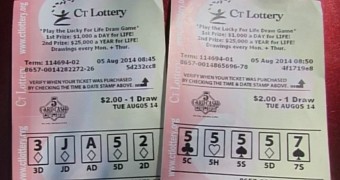Connecticut police have arrested and charged six suspects with crimes linked to altering lottery terminals to issue more winning tickets than usual, the Hartford Courant reports.
The six are Vikas Patel, 32, from Windsor, Pranav Patel, 32, from Bloomfield, Sedat Kurutan from Naugatuck, Moinuddin Saiyed from Norwalk, Prakuni Patel and Rahul Gandhi, both from Wallingford.
The first two were arrested on Friday, March 19, while the last four were took into custody between February 29 and March 7. All have posted bail and are now free, scheduled to appear in court in the coming weeks.
The suspects face charges of first-degree larceny, first-degree computer crimes and rigging a game.
5 Card Cash game was suspended last year for this reason
Prosecutors say that all are store owners or store employees, so at their workplace, tickets for the 5 Card Cash game have been sold in the past.
The 5 Card Cash lottery game consists of tickets that users can buy, on which playing cards are printed. If the five cards form a winning poker hand, then the buyer can get a sum of money based on the hand they received.
Authorities suspended the 5 Card Cash lottery game in Connecticut this past November after they discovered that there were more winning tickets than the game's winning range parameters should have technically permitted.
Clerks were slowing down lottery terminals to preview the tickets' content
Investigators for the Department of Consumer Protection and the Connecticut Lottery discovered that many clerks were abusing lottery tickets on purpose, to spew out winning tickets that they would later cash in for themselves. Authorities said that, besides the six brought in until now, more arrests are to be expected.
Police add that suspects used a glitch in the lottery terminals to see if the soon-to-be printed ticket was a winner or not. The terminal operators would request a database report, which would slow down the terminal's speed of operation.
Then they would buy a new ticket, but the terminal's lag would allow them to see the ticket's content before being printed. Seeing that the ticket was a dud, clerks would cancel the buy operation and abort the ticket's printing.
Doing this repeatedly, clerks abused terminals in their store. Investigators say they found terminals that printed winning tickets with a winning rate of 76%, 67%, 59%, and 58%, but that overall, abused terminals spewed winning tickets in 24% of the sales.

 14 DAY TRIAL //
14 DAY TRIAL //